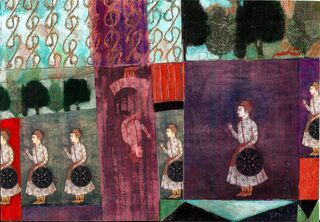Attention
In Pursuit of a "Harmonizing" Relationship
A Personal Perspective.
Posted November 1, 2022 Reviewed by Kaja Perina
Key points
- Nature is complex while simultaneously messy and beautiful, yet still offers a multitude of ready-to-emerge solutions for communication discord.
- When focusing on contexts (not content) that support mutual learning, we create a longer-lasting means for resolving complex problems.
- The need for solutions results from tensions immanent in everyday contradictions and double binds.
- Linear thinking perpetuates communication discord and creates barriers to understanding the contexts where solutions are found.
I am interested in a kind of mutually-alert care and attention to the well-being of all people and ecological systems. This kind of leadership cannot be found in individuals; rather, it is found between them...the genesis of ability to perceive and respond to the complexity of this time.
—Nora Bateson
Life is full of paradoxes, the source of humor, enlightenment, and, unfortunately, unenviable double binds. As an example, Partner A asks Partner B, "Do you love me,?" Partner B responds, "Yes," Partner A says, "Why do I have to ask you?"
A double bind is a dilemma in communication in which an individual (or group) receives two or more conflicting messages, with one message negating the other. This creates a situation in which a successful response to one message results in a failed response to the other, so that the person will be automatically wrong regardless of their response.
Double binds result from tensions immanent in everyday contradictions and are the source of the majority of relational problems. They can be exhilarating when successfully navigated or extremely stifling, as in being stuck between a rock and a hard place. We need only to look at how nature works to begin to understand this phenomenon.

Nature is complex while simultaneously messy and beautiful, yet still offers a multitude of ready-to-emerge solutions. I am not particularly fond of solutions being defined as a means of solving a relational problem. There is little context in this definition. On the other hand, "a liquid mixture” may be more readily useful as a context in overcoming those injurious double binds that hinder optimal interpersonal relations.
Not long ago, I had two parents and their four adult children in my office. Their presenting problem was extreme “communication discord.” What mostly concerned me during this initial session was how they continually described their concerns as isolated content driven descriptions i.e. “You never respect me,” responded by “Well you never give me respect, or “I am never heard,” followed by “You never listen,” etc. etc. There was blame and narrow views of “this caused that,” and so on and so on.
As it became louder and more intense, I grabbed a banana off the desk that was left over from my lunch, threw it on the floor, (much to their surprise} and asked each of them to describe five different interactional family events about a banana. After an amazing, focused time, they provided over 30 scenarios, many of which I could not have imagined doing with a banana e.g., how they made banana bread or mischievously faked a slipping incident. The tension subsided, there was laughter regarding these previously hidden from each other moments, but most importantly there was mutual sharing and numerous “I never knew that about you” remarks.
The subsequent sessions consisted of collaborative ways of relating that created a new sense about how they were interdependent. The pain of not allowing those complex pieces of information to be shared is what brought them to therapy. Like a work of art, they created new meaning for the future.
Our predominant but narrow cause-and-effect framework, found in most Western cultures, is a ubiquitous prelude to communication discord, polarization, climate and health issues, and more. The key takeaway about nature is its’ fluidity, that ii has no opposites, and is more than the sum of her parts. We are a vital part of nature, and it is within the relationship of these parts, which includes us humans, where we will eventually understand what it means to be interdependent problem solvers, the flowing ultimate basis of ecological thinking.
Even more profound, when we focus on contexts (not content) that support mutual learning, story sharing, and improvisation, we are encouraging a harmonizing means to go beyond double binds. Paying attention to dynamics in context allows for creating more meaningful differences that make a difference in mitigating discord. It becomes an aesthetic collaborative effort rather than a compromise or negotiation, where there are no true winners. This produces even wider contexts that ultimately break the above mentioned double binds.
My sense, working as a family therapist for the past 40 years, is that solutions lie in the present during win-win communication volleys. When individuals participate in a collaborative manner, they have the potential to consciously synchronize their mind and body rhythms, as exemplified in a very profound instance for me when John, who was 65, believed that his contentious relationship with his 87-year-old mother was unresolvable. “No matter what I say, I am wrong.” To his amazement, she agreed to attend a session. At this session, I gave them a prompt of ”What is continuing in your relationship?” I asked them to discuss this within three contexts: parenting, schooling and adulthood. The dialogue and body language, which was filmed for them, consisted of many surprises, affirmation, hugs and a respectful reframing of their relationship.
We are meant to be capable of having unique harmonizing relationships. When this happens, (and we have all felt it at one time or other,) there is a feeling of "good vibrations." This fosters opportunities to go beyond simple logic. It is tapping into the collective unconscious of all that has ever existed. What is revealed in this synchrony is previously available yet unheard information that arises and enlightens the connection between us. Sharing these interpersonal moments is the basis of changing perspectives, the driving force of evolution.
Families, couples, friends who demonstrate painful communication patterns have lost sight of the many possibilities to be empathically connected; however, there is a profound amazement, no matter how long they have known each other, when their misperceptions and assumptions come to the surface. It is when and how their unique stories, that were previously suppressed, prime the well of a new understanding of each other. This results in novel ways to dissolve assumptions and adversarial stances that sustain those powerful double binds. It is as close to how we will get to knowing how nature works, especially by not falling prey to thinking we are separate.




